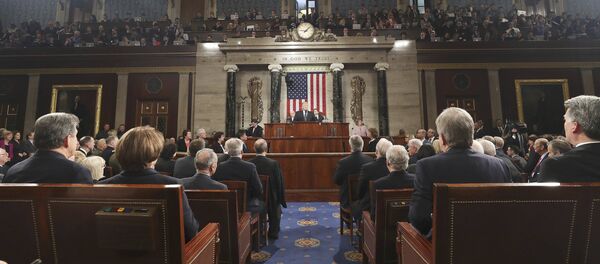The US has been recently dragged into a deep political crisis: by strangling Donald Trump's initiatives in both domestic and foreign affairs the bipartisan establishment in Washington risks turning the whole system upside down, Israeli political analyst Avigdor Eskin writes for RIA Novosti.
"The last [congressional] action aimed at forcing the US president into signing a law on sanctions against Russia, which he himself strongly opposed, indicates that there is a deep systemic crisis in the United States," Eskin pointed out.
On Wednesday Trump signed legislation expanding sanctions against Russia, targeting the country's defense, intelligence, mining, shipping and railway industries and restricts dealings with Russian banks and energy companies.
The bill punishes Moscow for alleged interference in the US 2016 presidential election, which still has to be proven.
In addition, the new law significantly limits the ability of the US president to ease or lift sanctions against Russia, as he would now need Congress's approval to reverse the measures.
Remarkably, the legislation was earlier passed in the Senate and the House of Representatives in a nearly unanimous vote.
One of Trump's recent tweets clearly indicates the president's attitude to Congress's initiative.
Our relationship with Russia is at an all-time & very dangerous low. You can thank Congress, the same people that can't even give us HCare!
— Donald J. Trump (@realDonaldTrump) 3 августа 2017 г.
"Our relationship with Russia is at an all-time & very dangerous low. You can thank Congress, the same people that can't even give us HCare!" Trump wrote on his Twitter account.
The American lawmakers are moving to force the Pentagon to develop medium-range missiles banned by the Intermediate-Range Nuclear Forces Treaty (INF Treaty) signed by the USSR and US back in 1987.
While Congress appears to do whatever it takes to finally ruin the US-Russian relationship, the truth of the matter is that Trump's voters supported the would-be president's decision to mend fences with Moscow, Eskin emphasized.
"US citizens chose a candidate who stressed the necessity for rapprochement with Russia in his foreign policy program," the political analyst wrote.

"There were also tough intentions towards Iran, and a promise to transfer the US embassy to Jerusalem, and a demand for NATO countries to expand their military budgets. However, [the relationship with] Russia was a priority, which is not surprising given its real power," Eskin noted.
The analyst recalled that the US Constitution provides wide powers to the president: the president is elected to conduct foreign policy with advice and assistance from the legislative and judicial branches.
"The founding fathers of the United States would have been shocked by the nearly unanimous decision of the Senate and the House of Representatives to pass new anti-Russian sanctions, being fully aware that the president and secretary of state regard the move as contradicting US [national] interests," the political analyst stressed.
"The Senate and the House of Representatives are blocking almost all [of Trump's] initiatives and imposing what he considers detrimental. The intelligence community undermines his policy through leaks. And all this is being exacerbated by scandals with the personnel, which is inevitable in the current nervous situation," he pointed out.
"The will of American voters and the incumbent president is not being implemented in any way," the analyst wrote. "[Spoiled] relations with Russia are just an example and a symptom. The much-praised American system went down."
"It was to be hoped that Donald Trump will be able to overcome the resistance he faces. Otherwise, the [US political] system will be struck by an incurable virus of disobedience and inaction," the Israeli political analyst concluded.




